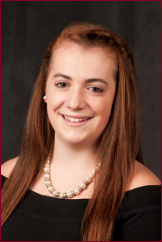Center for Community Studies
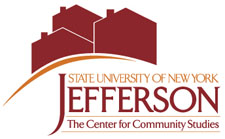
Since 1999, the Center for Community Studies has completed hundreds of research surveys for the community and for private companies. The Center ties professional knowledge from full-time faculty members to students learning statistics and mathematics to clients in the region who need data to solve real-world problems. We are the only local research entity and we produce a lot of high caliber information. Jefferson Community College is the only SUNY community college to have such a research center.
Latest Surveys
What have we been doing lately. Check out a list of reports.
Services We Offer
We offer primary and secondary research assistance.
Leadership
Meet the team and leadership behind the Center.
Who we are and what we believe
- To engage in the proactive and deliberate exchange of information between groups and individuals working for the community good.
- To promote active learning and encourage future leadership for Jefferson Community College faculty and students through the provision of research services to the community.
- To conduct high-quality independent research and analysis on issues of importance to the community, as identified by the Advisory Board or as funded by external organizations.
- To track and disseminate community indicators for knowledge-based decision-making in our region.
- To stimulate debate and dialog through community forums and presentations by recognized leaders on local, state and national issues of significance to the region.
- To achieve fiscal independence for organizational sustainability.
- Educational Excellence. We will uphold the College’s commitment to academic excellence in all of our activities.
- Integrity. We will do what is right, legally and morally.
- Objectivity. We are committed to maintaining a neutral point of view, independent of outside influence.
- Scientific Analysis. We will utilize rigorous scientific analysis in all research endeavors.
- Flexibility. We will maintain flexibility to be responsive to timely issues.
- Student Learning. We will never lose sight of the valuable role The Center plays in facilitating student learning through hands-on application.
- Commitment to the North Country. We are aligned with the North Country community served by Jefferson Community College.
Latest Annual Surveys
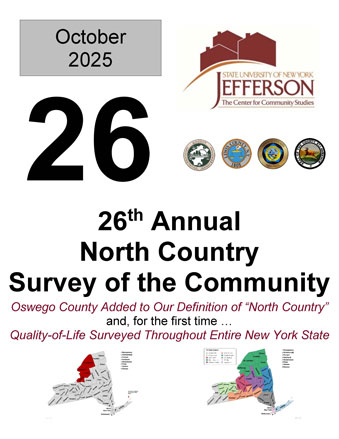
2025 North Country Survey of the Community
26th Annual North Country Survey of the Community
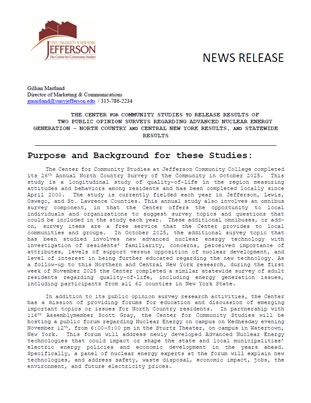
2025 State & Local Survey of Nuclear Energy
State and Local Surveys Regarding Advanced Nuclear Energy Generation

2025 North Country Issues Survey
4th Annual North Country Current Issues Survey
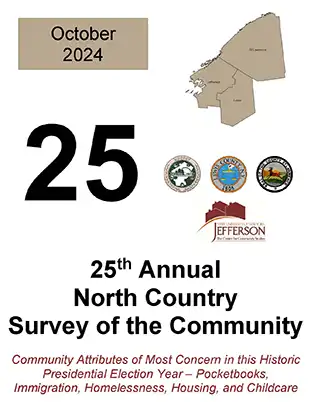
2024 North Country Survey of the Community
25th Annual North Country Survey of the Community

2024 North Country Current Issues Survey
3rd Annual North Country Current Issues Survey

2023 North Country Survey of the Community
24th Annual North Country Survey of the Community
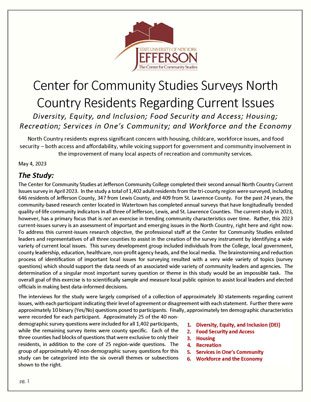
2023 North Country Current Issues Survey
2nd Annual North Country Current Issues Survey
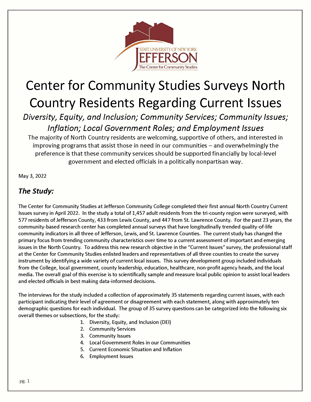
2022 North Country Current Issues Survey
1st Annual North Country Current Issues Survey
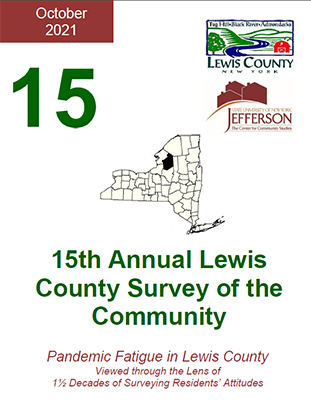
2022 Lewis County Survey of the Community
15th Annual Lewis County Survey of the Community
2021 Jefferson County Survey of the Community
22nd Annual Jefferson County Survey of the Community
2020 St. Lawrence County Survey of the Community
6th Annual St. Lawrence County Survey of the Community
2020 Jefferson County Survey of the Community
21st Annual Jefferson County Survey of the Community
2020 Lewis County Survey of the Community
14th Annual Lewis County Survey of the Community
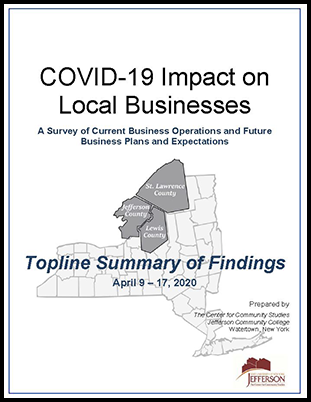
2020 COVID-19 Impact on Local Businesses
COVID-19 Impact on Local Businesses: Topline Summary of Findings
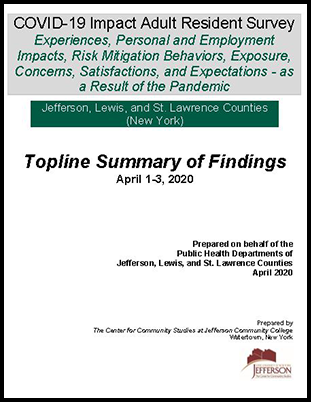
2020 COVID-19 Impact Adult Resident Survey
COVID-19 Impact Adult Resident Survey: Topline Summary of Findings
2019 Lewis County Survey of the Community
13th Annual Lewis County Survey of the Community: Summary of Findings
2019 Jefferson County Survey of the Community
20th Annual Jefferson County Survey of the Community: Summary of Findings
2018 Lewis County Survey of the Community
12th Annual Lewis County Survey of the Community: Summary of Findings
2018 Jefferson County Survey of the Community
19th Annual Jefferson County Survey of the Community: Summary of Findings
2018 St. Lawrence County Survey of the Community
4th Annual St. Lawrence County Survey of the Community: Summary of Findings
What we do
Primary research activities provided by the Center include all aspects of the scientific methods of research. The Center provides assistance with and completes the following primary research activities:
- Identifying and framing the research questions of interest
- Identifying the appropriate population(s) of interest
- Definition of variables to be sampled
- Design of the appropriate sampling strategies and protocol
- Collection of data using best practices
- Compilation and cleansing of data
- Weighting of data if necessary
- Statistical analysis of resulting data
- Interpretation of statistical findings, at times including recommendations
- Reporting of study findings in written format
- Presentation of findings to community audiences
Secondary research activities typically involve providing technical assistance in the form of statistical analysis and interpretation of statistical results for groups who possess existing data.
Sampling and data collection strategies typically utilized by the Center include but are not limited to:
- Telephone interviews from a state-of-the-art call center, calling both landlines and cellular phones
- Online surveys by use of weblinks
- Online surveys by use managed email lists
- Surveys via postal services
- Intercept (face-to-face) surveying and interviewing
- Focus groups
- Observation
Annual Quality-of-Life Surveys of the Community are conducted each spring (Jefferson County), summer (St. Lawrence County), and fall (Lewis County). Also, the biennial Regional Economic Tracking Survey is an inventory of the attitudes, opinions and behaviors of a representative sample of Jefferson, Lewis, and St. Lawrence County adult residents. The primary goal of the biennial Regional Economic Tracking Survey is to collect data regarding behaviors and perceptions of local economic development activities and initiatives to augment the information provided about quality-of-life indicators already being measured in the annual community surveys. Both of these sets of research activities that are provided to the community as a free service by the College are completed using random telephone surveying methodology. Along with providing tremendous experiential applied learning opportunities for students enrolled at SUNY Jefferson each semester, the benefit of these studies is to provide independent unbiased human research in the North Country to assist leaders and decision-makers in making data-driven decisions in the future. Much more detail for these community-service surveying activities is provided on their own pages of this website.
Since 1999, the Center for Community Studies has completed over 150 community-based studies throughout Northern New York on behalf of various community organizations that represent every sector of the community including – healthcare, government, education, planning, workforce, economy, media, communications, tourism, and entertainment. Each of these studies has been completed under contract with appropriate fees charged to the community organization to cover the cost of the research. Much more detail for these contracted community-based studies, including a partial list of past clients, is provided on the Contracted Studies for Community Organizations page of this website.
Upon request, the Center professional staff has historically provided assistance to community groups by facilitating a variety of speaker series, panels, trainings, and focus groups.
Research Tools - "Framing Statistics"
How to Best Use the Data Presented by the Center for Community Studies
The rationale behind providing so many analyses (statistics) for every survey question
included in this study is that one never fully understands the information contained
in a reported statistic without “framing” that statistic. Framing involves adding
a more rich perspective to the value of some reported statistic. For example, when
Jefferson County residents in April 2016 were asked the survey question, “When considering
you or your family's personal financial situation has it gotten better, stayed about
the same, or gotten worse in the past 12 months?”, the result in the 2016 community
study was that 25.2% of the participants responded with gotten better. So …. what
does this 25.2% really mean? Often-times community-based researchers will describe
the process of “framing” a statistic as completing as many as possible of the six
following comparisons (frames) to better understand a reported statistic from a sample:
- Within Response Scale Distribution - (Is it a majority? 4:1 ratio? “Three times more likely to respond with “better” …. than “worse”?
- Trend Across Time - (Has it increased? Decreased?)
- Compare to a Regional Average - (Compare to some regional average, is the current statistic higher? Lower?)
- Compare to Target/Benchmark - (Compare to an agency or community’s goal or target?)
- Ranking Among Similar Variables - (Among many different similar locations, characteristics, options, or attributes, that all use the same response scale, is this specific item ranked first? last?)
- Cross-tabulations by Potential Explanatory Variables - (Different political ideological people differ in opinion or behavior? Age-dependent? Gender-dependent? Education-dependent? Income-dependent? Military-affiliation-dependent? Geography-dependent?)
The design of all final study reports of findings produced by the Center for Community Studies include all of the various types of analyses, tables, and graphical depictions that are necessary to allow community leaders to best “frame the statistics” included in the reports, to best understand the statistics included, and make best decisions in the future regarding how to use the statistics. If one has further questions about “framing a statistic” please contact the professional staff at the Center for Community Studies.
"As a student at Jefferson I was given the opportunity to participate with the Center for Community Studies. I can say it was undoubtedly one of the most influential experiences I’ve been given. It helped inspire me to pursue a career in Mathematics with the aim to do research and data analysis. I was allowed an inside look into research and data analysis that most students do not get the privilege to witness until they acquire a career in the field. Not only was my experience with the Center for Community Studies educational, but I’ve left with stories and memories that I will cherish and many others that I can laugh about with friends to this day. It was so incredible to participate in something that actually affected the community; to see how the work was put to use to improve different aspects of the community. I believe my peers would agree that this was a unique and worthwhile opportunity afforded to us, and was a venture that we were lucky in which to partake."Megan Donato
To find out what we are working on or to receive copies of past reports, please contact us directly.
Contact the Center for Community Studies
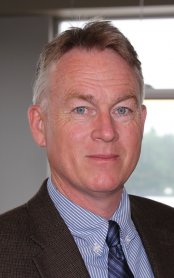 Joel LaLone
Joel LaLone
Director, Center for Community Studies
Retired Professor of Mathematics
Jefferson Community College
1220 Coffeen Street
Watertown, New York 13601
jlalone@sunyjefferson.edu
(315) 786-2264
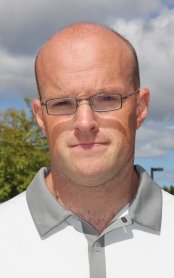 Larry Danforth
Larry Danforth
Research Director, Center for Community Studies
Assistant Professor of Mathematics
Jefferson Community College
ldanforth@sunyjefferson.edu
(315) 786-6553
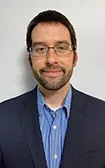 Andy Draper
Andy Draper
Research Coordinator, Center for Community Studies
Assistant Professor of Mathematics
Jefferson Community College
adraper@sunyjefferson.edu
(315) 786-2273
Advisory Board of the Center for Community Studies
The following community members in the three-county North Country Region of Northern New York State (Jefferson, Lewis, and St. Lawrence Counties) are currently serving on the Advisory Board of the Center for Community Studies.
- Nance Arquiett, NYS Department of Environmental Conservation
- Mary Corriveau, Community Member
- Larry Danforth, Jefferson Community College
- John Deans, Jefferson Community College
- Andy Draper, Jefferson Community College
- Sonja E. Draught, Fort Drum
- Dan Dupee, Jefferson Community College
- Richard Halpin, Community Member
- Tim Hunt, Lewis County
- Natalie Hurley, Indian River Central School District
- Jake Johnson, Jake Johnson Properties
- Joel LaLone, Jefferson Community College
- Joe Lawrence, Cornell Cooperative Extension
- Tracy Leonard, Credo Community Center
- Katie Malinowski, NYS Tug Hill Commission
- Jay Matteson, Jefferson County Economic Development
- Carl McLaughlin, Community Member
- John O’Driscoll, IBEW
- Ryan Piche, Jefferson County
- Megan Stadler, Jefferson Community College
- Steve Todd, Jefferson-Lewis BOCES
- Eric Virkler, Lewis County Treasury Department
- Henricus Wagonaar, City of Watertown
- Doug Welch, Community Member
- David Zembiec, Community Member
Past Leadership of the Center for Community Studies - Dr. John Deans, College President at the founding of the Center for Community Studies (1999)
- Dr. Richard Halpin, Director of the Center for Community Studies (1999-2002)
- Ms. Deborah McGloine, Director of the Center for Community Studies (2002-2003)
- Ms. Denise Young, Director of the Center for Community Studies (2004-2007)
- Mr. Richard LeClerc, Director of the Center for Community Studies (2007-2010)
- Dr. Raymond Petersen, Director of the Center for Community Studies (2011-2015)

